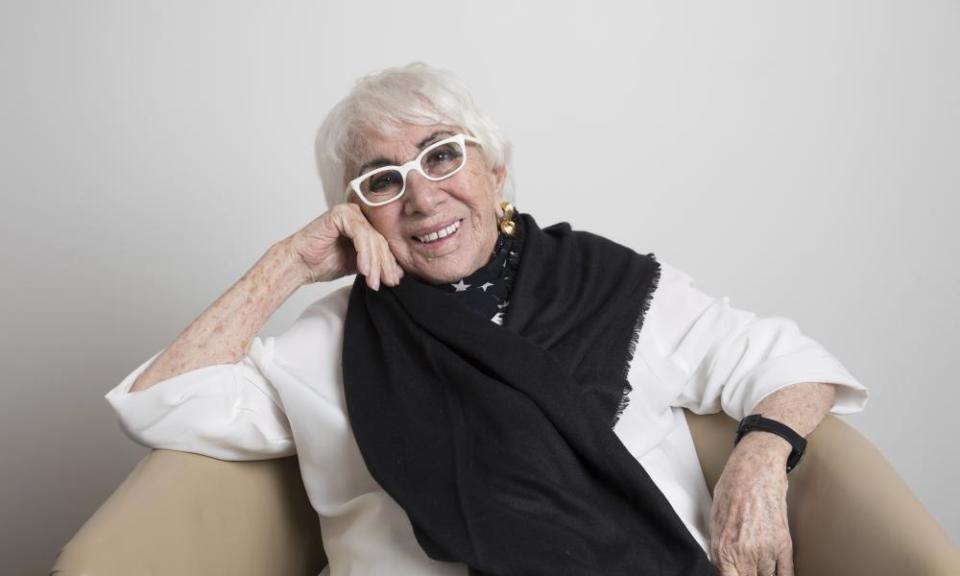Lina Wertmüller, first woman to be nominated for best director Oscar, dies aged 93

The one-time assistant director to Federico Fellini went on to have a distinguished directorial career in the 1970s
Lina Wertmüller, the Italian film-maker who was the first woman to be nominated for the best director Oscar, has died aged 93 in Rome. Wertmüller, whose scabrous political fables made a major impact on international cinema in the early 70s, was Oscar-nominated for her 1975 film Seven Beauties, and was awarded an honorary Oscar in 2019.
Born in 1928 in Rome, Wertmüller – whose full name was Arcangela Felice Assunta Wertmüller von Elgg Spanol von Braueich, due to her part-Swiss descent – became interested in theatre and performance in her 20s, touring Europe with a puppet company, before getting to know film director Federico Fellini (via a schoolfriend who was married to actor Marcello Mastroianni). She worked as an assistant director on Fellini’s 1963 masterpiece 8 1/2 (“I was the worst assistant, but that was overlooked because I was likable,” she later told the Guardian), and made her own film debut in the same year with The Basilisks, a slow-paced portrait of life in a southern Italian town, and which benefited from a score by Ennio Morricone.
Related: Ninety and out to shock: meet the first Oscar nominated female director
Wertmüller followed The Basilisks with a series of putatively commercial films, including the spaghetti western The Belle Star Story, which she co-directed with Piero Cristofani under the joint name Nathan Wich, and co-wrote under the name George Brown.
But the more directly political films on which her reputation principally rests were released in the following decade, several of them starring regular collaborator Giancarlo Giannini (best known to UK audiences as French agent René Mathis in Bond films Casino Royale and Quantum of Solace). They include The Seduction of Mimi (1972), with Giannini as a construction worker with a complicated personal life; Love and Anarchy (1973), about a would-be assassin who falls in love with a prostitute; and Swept Away (1974) – later remade by Madonna and Guy Ritchie – about a rich woman stuck on a desert island with a member of her boat crew.
Seven Beauties, again featuring Giannini as an Italian mobster who ends up in a Nazi concentration camp, was released in 1975, and won a clutch of Oscar nominations: as well as best director, Wertmüller was nominated for best original screenplay and best foreign language film, and Giannini for best actor.

Her increased international profile led to a Hollywood contract, and Wertmüller wrote and directed the English-language romantic drama A Night Full of Rain, starring Candice Bergen opposite Giannini. But the film was not a success, and her Hollywood career rapidly fizzled out. However, she returned to Italy and continued releasing films, though without the success of the 1970s. “Really, there are two strands – two souls – which coexist in my work: the lighthearted one associated with musical comedies and the more socially conscious one,” she told the Guardian.
In 1990 she directed Sophia Loren in a TV adaptation of Eduardo De Filippo’s play Saturday, Sunday, Monday, and a decade later in the TV film Francesca e Nunziata. Alongside her film and TV work she directed a number of operas, including Carmen in 1986 and La Boheme in 1997; she also dubbed the voice of Grandmother Fa for the Italian release of the 1998 Disney animation film Mulan.
Wertmüller was also known for the comedically long titles for many of her films: her 1978 release Blood Feud holds the record for the longest ever, according to Guinness World Records. The full title, at 179 characters is: “Un fatto di sangue nel comune di Siculiana fra due uomini per causa di una vedova. Si sospettano moventi politici. Amore-Morte-Shimmy. Lugano belle. Tarantelle. Tarallucci e vino.”
Wertmüller’s pioneering status was belatedly recognised, leading to the honorary Oscar to whose maleness she memorably objected.
Wertmüller was married to costume designer Enrico Job until his death in 2008.

 Yahoo Finance
Yahoo Finance 